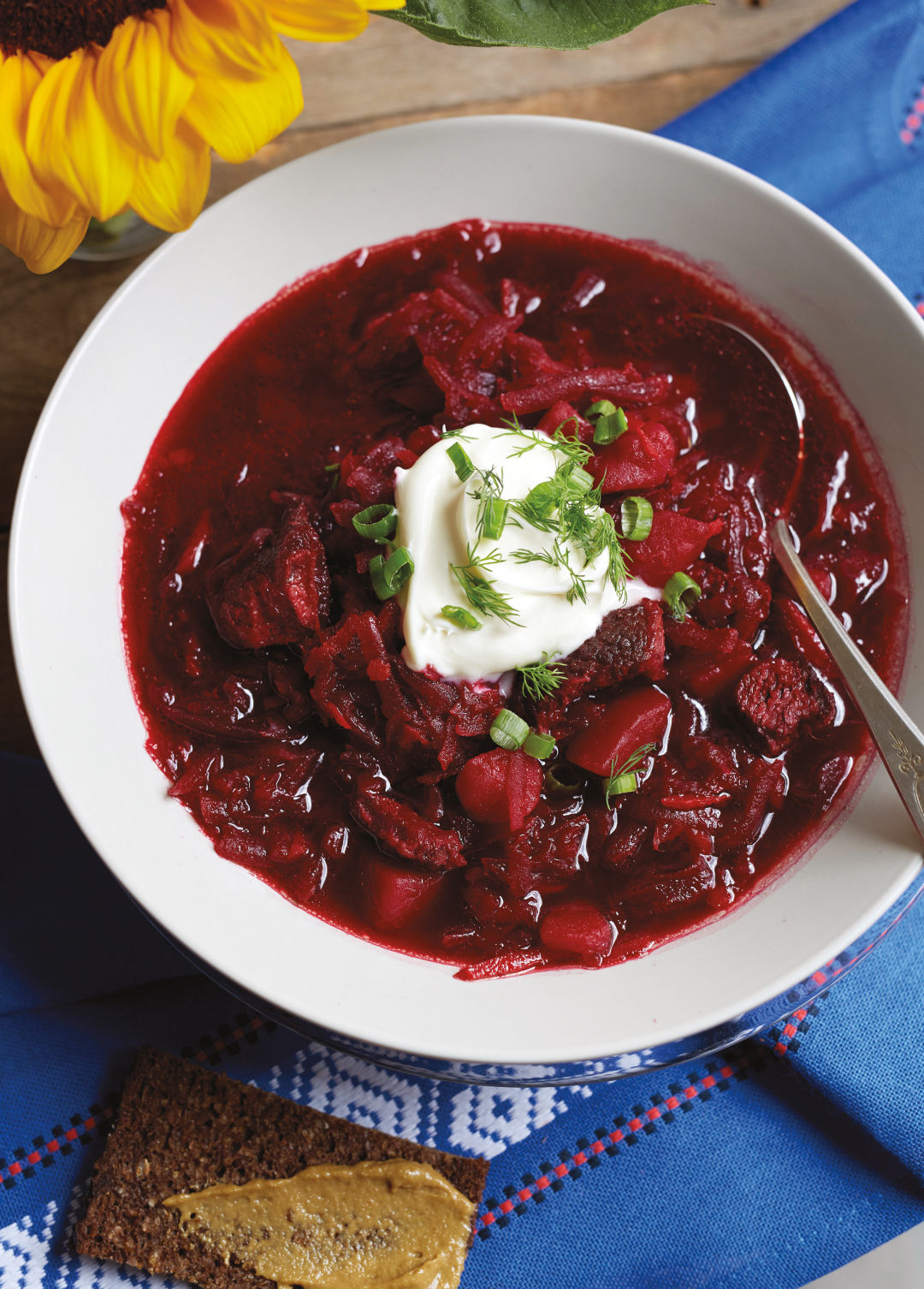Kachka's Glorious Cookbook Brings Home the Borsch (Yes, Borsch)

Chef Bonnie Morales's short rib borsch. Find Russian-style bread, mustard, and sour cream at Imperial Euro Market on SE Powell Blvd.
Image: Courtesy Leela Cyd
When Kachka first opened in 2014, I didn’t think it would last the year. There’s a reason for the drought of modern Soviet-era restaurants in America: it’s a cuisine cemented by cabbage, beets, and pickled herring. (And I say this as someone coming from very Eastern European folk.)
But owner Bonnie Morales proved me wrong, convincing Portland (along with Bon Appétit, the New York Times, and many others) that vintage USSR food, with its inborn comfort and surprising diversity, was not only worthy, but perhaps offers the most fun way to eat and drink. Morales and coauthor Deena Prichep capture that spirit in Kachka: A Return to Russian Cooking. Reading it feels a bit like marrying into a first-generation Russian family, with all the superstitions, carefully guarded recipes, and Cold War street smarts.

Image: Courtesy A. J. Meeker
Over the book’s 320 pages you’ll learn about the wonderful world of vodka infusions, secrets of DIY caviar (and how to spot the fake stuff), tips for navigating a Russian market and its bulk candy aisle, and how to MacGyver a mangal grill using your home Weber. And then there are the impressive, 100-plus recipes, from cold zakuski to the dumplings that built Kachka’s mini-empire: tender, farmers-cheese-stuffed vareniki.
While most of these dishes are too involved for a casual dinner, Kachka’s short rib borsch (the familar “t” at the end is a Yiddish addition) can be made with a quick trip to the grocery and a few hours to waste. There’s some irony in highlighting the most stereotypical Russian import from a restaurant that is all about expanding horizons, but this one’s damned good. Rich, meaty, herbaceous, and whipped with real, tangy Russian sour cream and searing mustard, it’ll knock your misconceptions about the Motherland back to the Eisenhower era.
Short Rib Borsch
Serves 4-6
- ¼ cup canola oil
- 2½ to 3 lbs bone-in beef short ribs
- Kosher salt
- 1 medium yellow onion, halved and sliced into thin half moons
- 2 large red beets, scrubbed
- 2 quarts beef stock
- 2 large Yukon gold potatoes, peeled and diced into ¾-inch cubes
- 1 carrot, peeled and grated on the large holes of a box grater
- 1 handful thinly sliced scallions
- 1 handful roughly chopped dill
- ½ cup smetana (Russian sour cream)
- Russian mustard
- 1 loaf dark Russian-style bread
Heat oil in a large stockpot over high heat. Season short ribs with salt on all sides and sear a few minutes on each side, or until dark brown. Remove ribs and set aside. Discard excess beef fat.
Lower heat to medium and add onions. Sauté, stirring occasionally, until caramelized (about 15 minutes). Add beets and cover with beef stock. Bring to a boil over high heat, reduce to barely a simmer, and cook until beets are half cooked, around an hour. Remove beets and set aside. Add short ribs back in and and cook at barely a simmer, uncovered, for 3–4 hours, or until fork-tender. When cool, peel beets and grate on the large holes of a box grater.
Remove short ribs again and set aside. Add potatoes to the pot, simmering for another 10 minutes, or until cooked through. Meanwhile, remove bones and chewy connective tissue from short ribs, and cut meat into bite-size pieces. When the potatoes are cooked, add the meat back to the pot, along with beets and the carrot.
To serve right away: simmer a few minutes longer, or until the beets are cooked through. To serve the next day: let cool and refrigerate overnight. Remove congealed fat from the top and reheat.
Garnish with a dollop of smetana and a sprinkling of dill and scallions. Serve with slices of dark bread with mustard, or stir the mustard directly into your soup.




